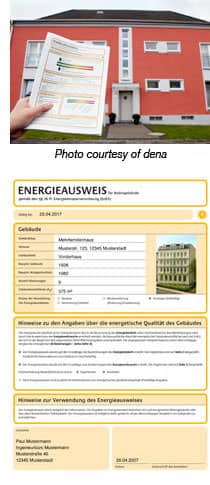To correct this situation Germany has begun to require buildings to have an Energy Certificate (Energieausweis) whenever they are sold or leased. These bring more transparency to the real estate market and provide all market participants with reliable information on the energy requirements and energy quality of a building.
Residential buildings built before 1965 needed to have the certificates commencing July 1, 2008. All other residential buildings will need them after January 1, 2009, and office and other non-residential buildings will have to have them commencing July 1, 2009. There is no requirement that all buildings have an energy certificate; they need one only if the owner intends to sell the building or rent it out (or an apartment, office, etc. within it.)

There are two types of Energy Certificates; a Demand Certificate (Bedarfsausweis) and a Usage Certificate (Verbrauchsausweis). A Demand Certificate is issued when an expert closely examines such aspects of energy efficiency as the walls, roof, windows and furnace. The Usage Certificate is based, much more simply, on the actual energy use of the property over the past three years.
Only specialists are authorized to issue the Demand Certificate. These can be engineers, architects or tradesmen with special certification. A list of approved issuers can be found on the website of the German Energy Agency (Deutsche Energie-Agentur, dena): https://effizienzhaus.zukunft-haus.info/aussteller/suche-experten/. (Website is in German) Always ask for written confirmation if you are not sure that the person doing the assessment is authorized.
The cost for the Demand Certificate is dependent on the size and the intended use of the property and will be between €150 and €650. The consumer-oriented ID is substantially cheaper, starting at €30 due to a smaller workload for the issuer/assessor. The certificates contain concrete modernization recommendations, which can be used to plan the refurbishment of a building or to develop more detailed energy advice.
The law stems from the European Union’s directive on energy performance for buildings. Germany used it as the basis for its Energy Saving Ordinance (Energieeinsparverordnung), enacted in 2007. The German Energy Agency strongly favors the Demand Certificate. A building may look good with a Usage Certificate even though the energy costs were great. It may only have been rarely occupied over the last three years.
This is why residential buildings with fewer than five apartments that were built before 1977 are required to have the Demand Certificate. Other buildings have their choice between the two certificates because a law that took effect in 1977 made a number of energy saving measures compulsory in new buildings.


























